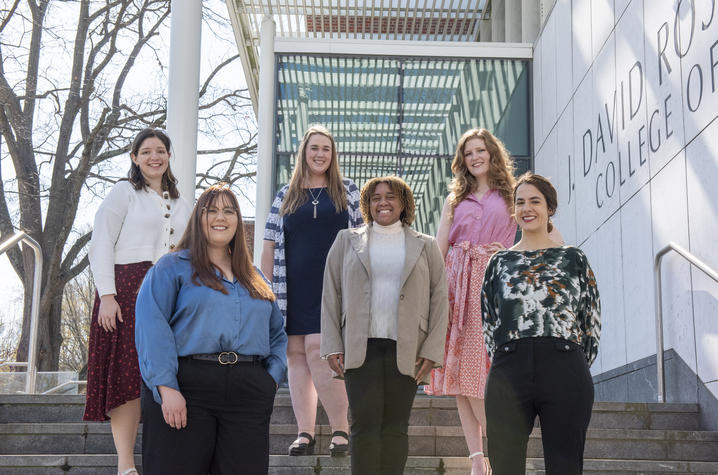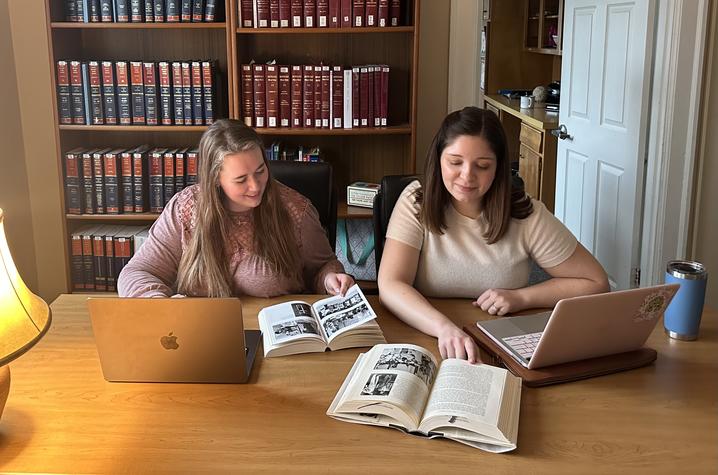UK law students continue work to solve cold cases with CRRJ-KY
LEXINGTON, Ky. (June 18, 2024) — Following the success of last year’s pilot program, the Civil Rights and Restorative Justice Clinic at the University of Kentucky J. David Rosenberg College of Law (CRRJ-KY) will be offered again this fall as an experimental course, with the third cohort of students due to begin their case work in August 2024. The clinic receives additional funding support from the UK Commonwealth Institute for Black Studies (CIBS) and will, once again, follow the model established by the Civil Rights and Restorative Justice Project (CRRJ) housed at Northeastern University School of Law.
CRRJ-KY students will investigate cases of historical homicide that took place in the Commonwealth of Kentucky during the Jim Crow-era. Moving beyond the highly publicized and large-scale spectacles of lynchings, clinic students will investigate cases of lesser-known and, at times, everyday instances of violence. The circumstances surrounding each incident vary, including labor violence, community violence and police killings.
Clinic students will also be tasked with using the legal practice of restorative justice to bring these historical cases to the present — working with living descendants and community figures to develop meaningful redress for the harms in the past.
“It has been thrilling to see the way that CRRJ-KY has taken off under the leadership of Professors Hughes and Zinkle,” said CRRJ staff attorney and Elizabeth Zitrin Justice Fellow Olivia Strange, who helped establish the partnership. “Their success and the successes of their fantastic students prove why it is so vital to bring CRRJ’s brand of historical justice work directly into the states, localities, and communities where the violence occurred.”
CRRJ staff attorney Strange and CRRJ’s lead historian Jay Driskell will support UK Rosenberg Law’s clinic students by assisting with the collection of case files and the creation of dockets for the students to pursue. Some of the cases that this year’s students will research were uncovered by the five students who participated in the 2023 clinic, while sifting through records and archives each of their assigned case investigations.
The CRRJ-KY course, including a weekly seminar alongside the clinical case work, will continue to be co-taught by Professor D’lorah Hughes, H. Wendell Cherry Associate Clinical Professor of Law, and historian Dr. Austin Zinkle.
“This clinical program at UK Rosenberg Law is not merely a project of historical research; this historical justice work calls for creative lawyering," Hughes said. "In these cases, law students will face complex, messy problems for which there will be many different responses across a wide range of clients, communities and claimants seeking justice."
Hughes, who joined UK Rosenberg Law in June 2022, serves as the director of Legal Clinics and Externships and holds a leadership position on the board of directors for the Clinical Legal Education Association. She was also recently appointed to the Lexington-Fayette Urban County Government Ethics Commission and was recently awarded the 2023 Trinia Clemons Friend of Pro Bono Award.
Zinkle, who completed his Ph.D. in July 2023 at UK, is a postdoctoral scholar affiliated with CIBS. His current research project explores white supremacist and neo-Nazi youth during the twentieth century.
“This CRRJ clinic at Kentucky’s law school has added immensely to our national effort to record and redress Jim Crow era lethal racial violence,” said CRRJ Director Professor Margaret Burnham. “Students have not merely enriched Kentucky’s reparative agenda, but they have sharpened important lawyering skills as they have unearthed long-buried facts and collaborated with community advocates. For us in Boston, this has been a vitally important partnership.”
This year’s cohort of students will continue to develop pathways for redress within these cases of historical injustices.
As the state’s flagship, land-grant institution, the University of Kentucky exists to advance the Commonwealth. We do that by preparing the next generation of leaders — placing students at the heart of everything we do — and transforming the lives of Kentuckians through education, research and creative work, service and health care. We pride ourselves on being a catalyst for breakthroughs and a force for healing, a place where ingenuity unfolds. It's all made possible by our people — visionaries, disruptors and pioneers — who make up 200 academic programs, a $476.5 million research and development enterprise and a world-class medical center, all on one campus.






